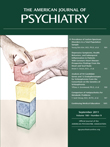T
o the E
ditor: The correlational relationship between psychotic symptoms and functional outcome is weak, as Gordon and Green note. However, it is another matter to conclude that antipsychotic medication is not relevant to community functioning, quality of life, and well-being. A minority of studies hint at an advantage for work functioning for unmedicated patients (
1). In contrast, we and others have found a number of advantages of consistent use of antipsychotic medication that extend beyond symptom control, notably improvement in cognition (
2), brain myelination (
3), and work productivity (
2–
5).
The Subotnik et al. (
4) study of medication nonadherence and return of psychosis was conducted in the context of a project that aimed to help people with recent onset of schizophrenia pick up where they left off at work or school, as quickly as possible, to avoid the demoralization that accompanies chronic disability. We used individual placement and support (IPS) integrated into the treatment team at the UCLA Aftercare Research Program to accomplish this (
6), and we were quite successful at getting patients back to work or school (
7). We believe that there is a synergistic effect of medication and IPS, as medication improves a patient's potential for work recovery and IPS helps to actualize that potential.
We also agree that individuals with schizophrenia appear to learn about their illness over time, and their awareness of having a mental disorder generally improves over the initial phase of illness (
8). However, we think that the learning is optimized when a review of past symptoms occurs after the psychotic symptoms have eased, and this is most likely to happen after consistent use of antipsychotic medication.
Our findings about nonadherence to risperidone are in the context of a protocol that strongly encouraged adherence to the dosage that was tailored to each individual's needs. Nonadherence was often accompanied by poor insight regarding the benefits of medication. It is possible that nonadherence was in some instances triggered by an undetected brewing storm of subclinical symptomatic and psychophysiological changes that also made the effects of brief periods of partial nonadherence even more hazardous. This situation is quite different from that of a shared decision to start an off-medication trial for a person who has been doing very well over an extended period. In that context, the return of psychosis is not as swift (approximately 8 months [
9]) as it is in the case of nonadherence to medication as prescribed (approximately 2.5 months [
10]). If an off-medication trial is pursued collaboratively, we recommend careful and perhaps more frequent clinical monitoring, with family involvement to alert the treatment team to any early warning signs of relapse. Physicians should not abandon their patients during an off-medication trial that reflects shared decision making, and there is no reason for patients to similarly abandon their physicians. Both need to recognize the high likelihood that psychotic symptoms will return, as well as the emerging evidence that consistent antipsychotic treatment has a neuroprotective effect (
3,
11). Small increases in positive symptoms can sometimes be handled with a psychosocial intervention without a resumption of medication. However, a significant exacerbation or relapse following a period of medication nonadherence or an off-medication trial is a clear signal that medication needs to be resumed.

